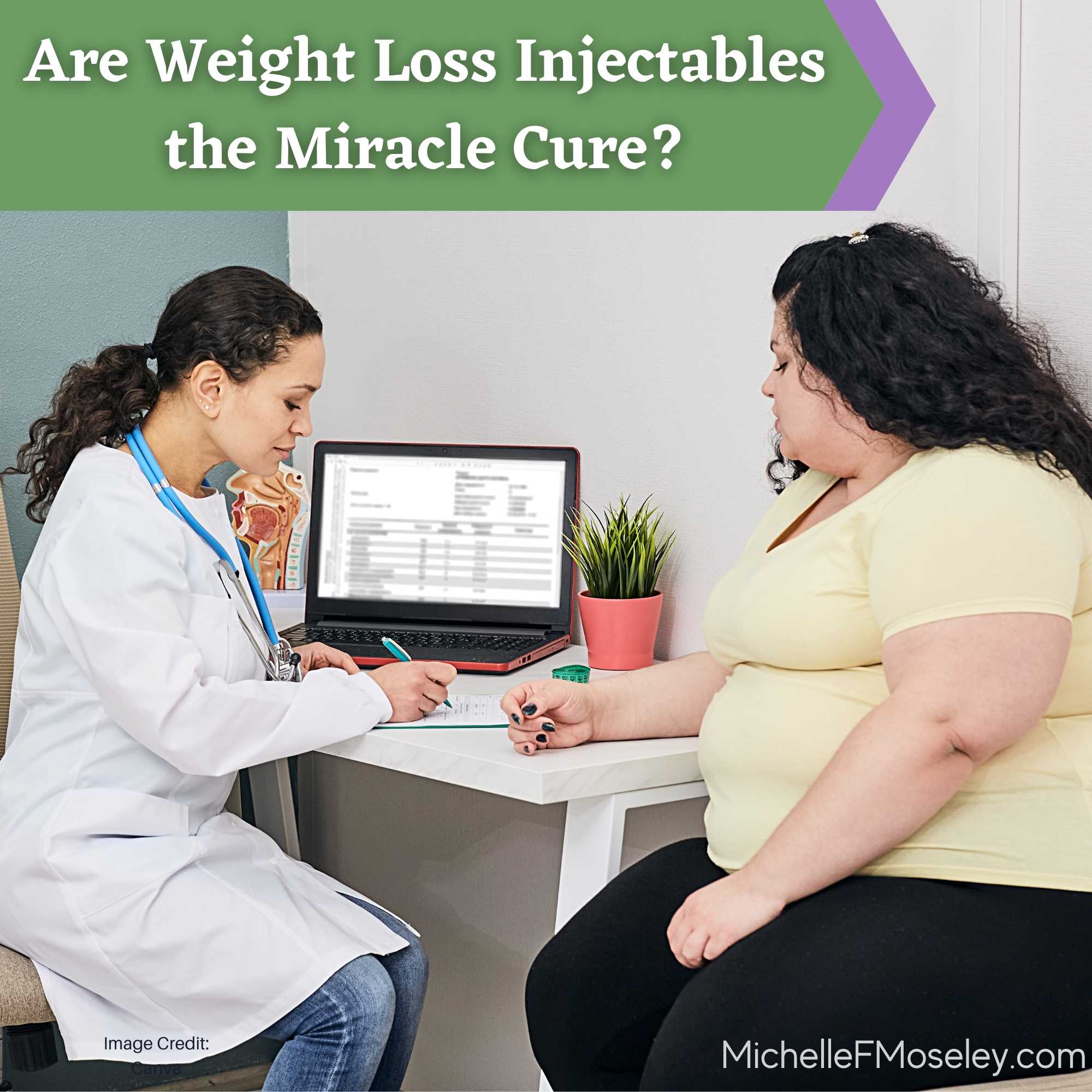Weight Loss Injectables are being promoted as the new “miracle cure” in the fight to shrink bodies. You’ve likely seen the ads for Ozempic, Wegovy, Mounjaro, or the like. You may be confronted with the currently shrinking bodies of folks – both those in your personal life, as well as celebrities or social media influencers. And, if you happen to be in a larger body like myself, you have quite likely had a medical provider suggest (maybe even attempt to push you into) taking one of these weekly injections.

Now, before I get too far into this topic, here are a few things to note:
- I am a fat person. I use the term “fat” as a neutral descriptor of my body, which is not something I could always do.
- I am in recovery from an undiagnosed eating disorder. The habits, rituals, and substantial change in weight that I experienced were celebrated because I was still viewed as “overweight.” (Spoiler alert: There is no set weight that is correct for all bodies. That’s a topic for another day, but I will not be using the “O” words – overweight and obese – in this post.)
- I have done years of hard work and healing around my own body image and relationship with food, yet many people still view me as “lazy” or a “failure” due to the fact that I have healed into a fat body.
- I believe that ALL bodies deserve respect and access to mental and physical healthcare.
- I believe that individual autonomy is important in making decisions about your body and making choices related to if and how you pursue healthcare.
- Though I adamantly disagree with the anti-fat bias that pressures those in larger bodies to pursue weight loss, I fully support each individual’s right to make decisions about what they believe is best for them.
- I understand why someone in a fat body in the US would choose options such as surgery or medication in an effort to shrink their body. It is easier to exist in this society when your body is smaller. There is no blame or shame from me directed toward those who are considering or have made these decisions.
The Injectables
This is a high-level overview of the weight loss injectables currently being advertised and prescribed. There are continually more studies being conducted as pharmaceutical companies seek approval to prescribe higher doses or to prescribe to younger patients.
These medications – semaglutide and tirzepatide – are officially known as GLP-1 agonist medications. Semaglutide includes Ozempic and Wegovy. Ozempic was originally approved to assist with regulating blood sugars in the treatment of diabetes. Wegovy is a much higher dosage of the same medication (up to 4x higher) now being promoted for weight loss. Rybelsus is an oral form of semaglutide being considered for weight loss. Tirzepatide includes Mounjaro – used in the treatment of diabetes – and Zepbound – used for weight loss.
The original intent for these medications was to assist in controlling blood sugar levels and to help insulin be used more effectively by those with diabetes. From speaking with some folks who have worked in the area of treating insulin resistance from a weight-inclusive perspective, I learned that the initial (much lower) early doses of these medications were quite effective in regulating blood sugars.
However, one of the side effects for some folks was weight loss. The pharmaceutical companies saw $$$$$ signs at the idea of prescribing higher dosages in order to increase that side effect and play off the hope of millions of people to finally be able to lose weight for good.
When you increase one side effect, you quite likely increase others as well! So, at the higher dosages, people experience much more frequent gastrointestinal issues. Some people have even experienced permanent paralysis of their digestive systems.
These high dosages work because they inhibit your hunger cues, increasing disconnection from your body and leading to possible malnutrition due to not eating enough calories for your brain and body to thrive.
The longest studies on the use of these medications for weight loss have run for only 2 years. Many participants didn’t complete the study because the side effects were too disruptive. Additionally, the trend was toward weight gain at the time the studies ended. So, we don’t really even know the true long-term effectiveness or effects of these drugs.
The Diet Industry
The diet industry in the US is a 72+ billion dollar industry. This includes everything from the shakes and powders to the packaged meals to the lifestyle plans and workout programs we’re sold. Television shows like The Biggest Loser are part of the diet industry. Celebrities who share their own weight loss journeys and become spokespeople for the many companies and apps focused on making bodies smaller are all a part of the diet industry.
This industry tells us that certain bodies – generally thin, white, abled bodies – are more worthy and are what we all need to strive toward. The diet industry then sells us programs and products that are supposed to help us change our bodies to become more like that supposed ideal. When these changes don’t happen the way we were promised, the diet industry then shames us for not trying hard enough and is right there to sell us another product.
Did you know that diets (even the ones touted as “lifestyle changes”) fail at least 95% of the time? (Some studies say that number is closer to 98%.) That means that within 5 years, at least 95% of people who experienced any weight loss through one of these programs or products (including bariatric surgery), will have gained back the weight they lost. They will often find themselves at an even higher weight as their body works to stabilize itself.
The diet industry fails us, yet keeps calling us back for more!
Anti-Fat Bias
The strength of anti-fat bias in US culture is so strong that folks would rather risk lifelong side effects or illness than to exist in a large body.
What is anti-fat bias? It’s all the prejudices and negative stereotypes we have about fat people. Here are some examples of anti-fat bias:
- The belief that people in larger bodies are lazy or unintelligent.
- The lack of clothing options available in larger sizes.
- The body-related harassment that is posted online toward plus-size creators (or anyone whose body has gotten larger).
- Statements such as “Nothing tastes as good as skinny feels”, which are based on not wanting to be treated the way that fat folks are treated.
- The exclusion of fat bodies from movement activities, and the lack of modifications offered for fat folks desiring to participate in movement.
Internalized anti-fat bias impacts folks who exist in larger bodies. Self-directed thoughts that body size indicates one’s worth or intelligence are an example of how anti-fat bias is internalized. Beliefs that you don’t belong in a space or are not allowed to engage in an activity solely due to body size are other examples of anti-fat bias.
Anti-Fat Bias in Medical Care
The medical field is an area that is filled with anti-fat bias. Unfortunately, there are very few providers who practice from a weight-inclusive perspective. A weight-inclusive perspective means that the provider is not going to make assumptions that the size of a patient’s body is the cause of all ailments or concerns. A weight-inclusive provider will spend time fully assessing a patient’s concern and work with the patient to determine the best course of action.
A weight-inclusive provider does not assume that someone in a smaller body is automatically healthier because the provider knows that health is about far more than body size. A medical provider practicing from a weight-inclusive perspective is also more likely to identify an eating disorder, regardless of a patient’s body size, because they know that disordered eating patterns can occur in anyone, regardless of their weight.
If you are someone who exists in a smaller body, you may have trouble understanding how prevalent anti-fat bias is within medical settings. The following are a few examples of anti-fat bias I have personally experienced from medical providers:
- Being told to “eat like a bird” during puberty. Keep in mind that a 40-lb weight gain over the 4 most active developmental years of adolescence is typical.
- Receiving a 10-minute lecture about weight loss when I went to an urgent care for a sinus infection. Do thin people not get sinus infections?
- Having a psychiatrist colleague comment on my weight during a passing moment in the office. I was not this provider’s patient, and did not seek this person’s input on any personal concerns.
- Having a primary care physician repeatedly ask me about my “plan for weight loss” after I had disclosed my history of an eating disorder.
- Being recommended one of the aforementioned weight loss injectables multiple times to address “the weight issue” despite clearly stating that I am not interested in being prescribed these medications.
In that last example, the provider did not provide any details about possible side effects or discuss the specifics of the medication with me. This provider views me as someone who is fat and needs to not be fat, so they were completely focused on prescribing the “solution” to what they viewed as the “problem.” This type of interaction does not lay a foundation for informed consent. How can a patient fully consent to a treatment option when they are not presented with all the information?
Anti-fat bias has led to many medical providers viewing body size as the only possible reason for any concern a larger-bodied patient may have. Right now, the pharmaceutical companies are telling those providers that the answer lies in these injectables. It eerily reminds me of the early days of oxycontin and the promotion of opiates by pharmaceutical companies to address all reported pain.
More Resources
If you want to explore these topics more, I recommend Regan Chastain’s Weight and Healthcare Substack. Ragen is a researcher who brings that background to the topics of weight, anti-fat bias, and healthcare.
Looking to explore alternatives to what the diet industry has offered? Here are a few resources that may be helpful on that journey:
- Center for Body Trust – Learning to heal and trust your body again.
- Health at Every Size (HAES) – A social justice framework for considering various aspects of health, without an emphasis on body size.
- Intuitive Eating – Ten principles to help you reconnect with your body and heal your relationship with food.
For those located in North Carolina, I also offer individual therapy focused on body image concerns. At least once per year, I facilitate a Body Mindfulness Virtual Group which offers discussion, activities, and education to help you heal your relationship with food and your body. I encourage you to contact me if you’d like to explore these services further.
Michelle F. Moseley is a Licensed Mental Health Counselor in NC. She believes ALL people deserve respect, compassion, and access to mental and physical healthcare. Michelle specializes in working with survivors of religious trauma and with those who have body image concerns, finding there is frequent overlap in these areas. You can learn more about Michelle by visiting her website at MichelleFMoseley.com or following her on Instagram – @therapy_with_michelle
Sign-up for Michelle’s Monthly Email Newsletter to make sure you never miss a blog post


